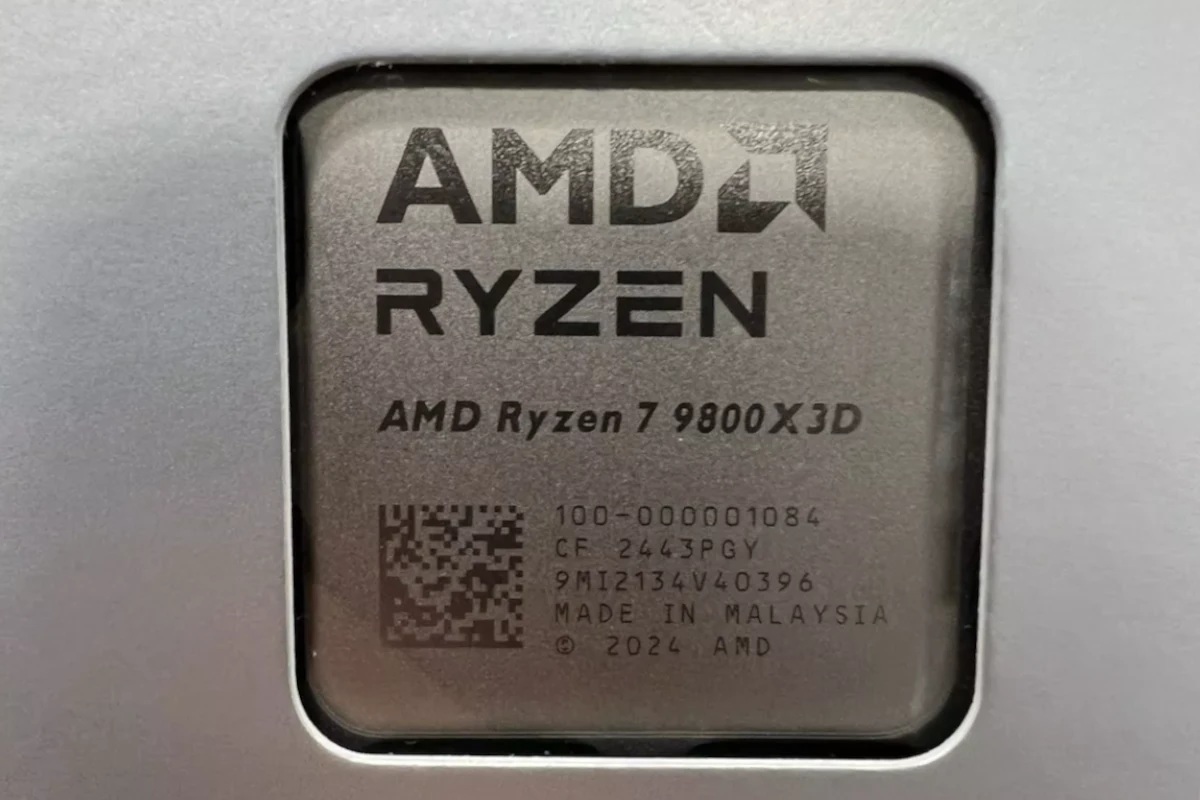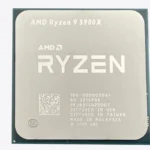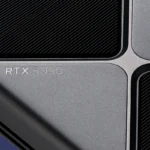AMD’s latest processor, the Ryzen 7 9800X3D, brings impressive upgrades to the gaming CPU market. This chip features AMD’s advanced 3D V-Cache technology, which significantly boosts gaming performance. The Ryzen 7 9800X3D delivers devastating gaming performance, making it a top choice for enthusiasts seeking the best frame rates.
The processor boasts eight cores and 16 threads, providing ample power for both gaming and productivity tasks. Its unique architecture allows for an expanded L3 cache, increasing from 32 MB to a substantial 96 MB. This game-boosting 3D V-Cache tech sets the 9800X3D apart from its competitors.
Gamers will appreciate the CPU’s ability to excel in low-settings 1080p gaming when paired with a high-end graphics card. While the price point is higher than some alternatives, the performance gains may justify the cost for those seeking top-tier gaming experiences.

AMD Ryzen 7 9800X3D Review: A Gaming Beast Unleashed
The AMD Ryzen 7 9800X3D has arrived, and it’s making waves in the gaming world. This 8-core, 16-thread CPU boasts AMD’s “Zen 5” architecture and a massive 104MB of L3 cache thanks to 2nd Gen 3D V-Cache™ technology. But does it live up to the hype? Let’s dive into the details.
Gaming Performance: A True Game Changer
The 9800X3D is an absolute monster when it comes to gaming. Users are reporting incredible performance gains, even when paired with older GPUs. One user saw their Arma 3 FPS jump from 60 to over 200 at max settings, and League of Legends FPS soar above 450. Even in CPU-intensive titles like Planetside 2, the 9800X3D delivers a significant boost.
This impressive performance is largely attributed to the massive L3 cache. Games can store more data closer to the CPU cores, resulting in significantly reduced latency and smoother frame rates. This is especially noticeable in games that are heavily CPU-bound, where the 9800X3D truly shines.
Price and Value: Is it Worth the Investment?
The 9800X3D is a premium CPU with a price tag to match. However, many users believe it’s worth the investment, especially for gamers seeking the absolute best performance.
There’s some debate about whether the 9800X3D is a worthwhile upgrade over the previous generation 7800X3D. While the 9800X3D offers better performance overall, the difference might not be significant enough for everyone, especially at higher resolutions where the GPU becomes more of a bottleneck.
Ultimately, the decision depends on your budget and your needs. If you’re looking for the best possible gaming CPU and are willing to pay for it, the 9800X3D is the clear choice. However, if you’re on a tighter budget, the 7800X3D or even the 7600X3D still offer excellent gaming performance at a lower price.

Other Considerations:
- Overclocking: The 9800X3D supports overclocking, allowing you to push its performance even further.
- Future-proofing: The 9800X3D is built on the AM5 platform, which is expected to be supported for several years to come. This means you’ll be able to upgrade to future AMD CPUs without needing a new motherboard.
- Availability: Due to high demand, the 9800X3D might be difficult to find in stock.
Final Verdict:
The AMD Ryzen 7 9800X3D is a powerhouse gaming CPU that delivers exceptional performance. While it comes at a premium price, its incredible gaming capabilities and future-proof platform make it a compelling choice for gamers who demand the best.
Building a Balanced System: Pairing Your CPU with the Right GPU
Choosing the right CPU is crucial for a smooth gaming experience, but it’s equally important to pair it with a compatible GPU. A powerful CPU like the 9800X3D can be held back by a weak GPU, while an overly powerful GPU might be bottlenecked by a less capable CPU.
Here are some general guidelines for pairing your CPU with a GPU:
- Entry-level CPUs: Pair with GPUs like the RTX 3060 or RX 6600.
- Mid-range CPUs: Pair with GPUs like the RTX 3070 or RX 6700 XT.
- High-end CPUs: Pair with GPUs like the RTX 4080 or RX 7900 XT.
- Enthusiast CPUs: Pair with GPUs like the RTX 4090 or RX 7900 XTX.
It’s important to consider the resolution and refresh rate of your monitor as well. Higher resolutions and refresh rates generally require more powerful GPUs.
Ultimately, the best way to determine the optimal CPU/GPU pairing is to research benchmarks and reviews for the specific games you play. This will give you a better understanding of how different CPUs and GPUs perform together and help you choose the right combination for your needs.
Key Takeaways
- The Ryzen 7 9800X3D offers exceptional gaming performance with 3D V-Cache technology
- It features 8 cores, 16 threads, and an expanded 96 MB L3 cache
- The processor excels in low-settings 1080p gaming with high-end GPUs
Technical Specifications and Architecture
The AMD Ryzen 7 9800X3D boasts cutting-edge features that set it apart in the processor market. This powerful chip combines advanced architecture with innovative cache technology to deliver exceptional performance for gaming and high-demand applications.
Processor Design and 3D V-Cache Implementation
The Ryzen 7 9800X3D is built on AMD’s Zen 5 architecture, codenamed Granite Ridge. It features 8 cores and 16 threads, providing robust multitasking capabilities. The standout feature is the 2nd generation 3D V-Cache technology, which stacks additional L3 cache directly on top of the compute die.
This implementation results in a massive 96 MB of L3 cache. The increased cache size significantly reduces memory latency, a critical factor in gaming performance. 3D V-Cache gives the 9800X3D a notable edge in games that benefit from quick data access.
The processor also supports AVX-512 instructions, enhancing its capabilities for certain computational tasks.
Clock Speeds and Performance Metrics
The Ryzen 7 9800X3D operates at a base clock of 4.7 GHz, with the ability to boost up to 5.2 GHz under optimal conditions. This high frequency, combined with the large cache, contributes to its stellar gaming performance.
AMD’s Precision Boost Overdrive (PBO) technology is fully supported, allowing users to fine-tune performance. This marks a departure from previous X3D models, which had limited overclocking capabilities.
Key performance metrics include:
- Single-core performance: Excellent for lightly-threaded tasks
- Multi-core performance: Strong for content creation and productivity
- Gaming performance: Top-tier, often surpassing competitors
Compatibility with Motherboards and RAM
The Ryzen 7 9800X3D uses the AM5 socket, ensuring compatibility with a wide range of modern motherboards. It supports PCIe 5.0, providing future-proofing for high-speed storage and graphics cards.
RAM compatibility includes support for:
- DDR5 memory
- Dual-channel configurations
- High-speed modules for optimal performance
Users should pair the 9800X3D with fast DDR5 RAM to fully leverage its capabilities. The processor’s memory controller can handle high-frequency modules, allowing for reduced latency and increased bandwidth in memory-intensive tasks.
Performance Analysis and Benchmarks
The AMD Ryzen 7 9800X3D demonstrates exceptional performance across gaming and productivity tasks. Benchmarks reveal its strengths in various scenarios, particularly in gaming where it excels against competitors.
Gaming and Productivity Benchmarks
The Ryzen 7 9800X3D shines in gaming benchmarks. It consistently outperforms other CPUs in popular titles. In Cyberpunk 2077, the processor achieves high frame rates at 1080p, providing smooth gameplay.
Productivity tests show improvements over previous generations. Cinebench scores indicate strong multi-core performance. The CPU handles content creation tasks efficiently.
Adobe Premiere render times are reduced compared to older models. This makes the 9800X3D an attractive option for video editors.
Blender benchmarks showcase the processor’s capabilities in 3D rendering. It completes complex scenes faster than many competitors.
Real-World Gaming Scenarios
In actual gaming situations, the Ryzen 7 9800X3D proves its worth. Players experience smoother gameplay and higher frame rates across various genres.
Open-world games benefit from the CPU’s power. Large environments load quickly, and NPCs move fluidly.
Esports titles run exceptionally well. The processor’s high clock speeds and cache size contribute to reduced input lag.
The 9800X3D establishes itself as a top gaming CPU, especially for those seeking maximum performance at 1080p resolution.
Comparative Analysis with Competing CPUs
When compared to Intel’s offerings, the Ryzen 7 9800X3D often comes out on top in gaming tests. It outperforms many high-end Intel processors in frame rates and overall smoothness.
In productivity tasks, the 9800X3D holds its ground. It competes well in Photoshop and Premiere benchmarks against similarly priced Intel CPUs.
Power consumption is an area where AMD has made strides. The 9800X3D offers competitive performance while maintaining efficiency.
For users considering an upgrade, the 9800X3D presents a compelling case. Its gaming prowess and solid productivity performance make it a versatile choice for enthusiasts and content creators alike.







